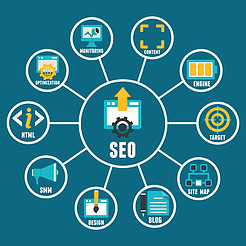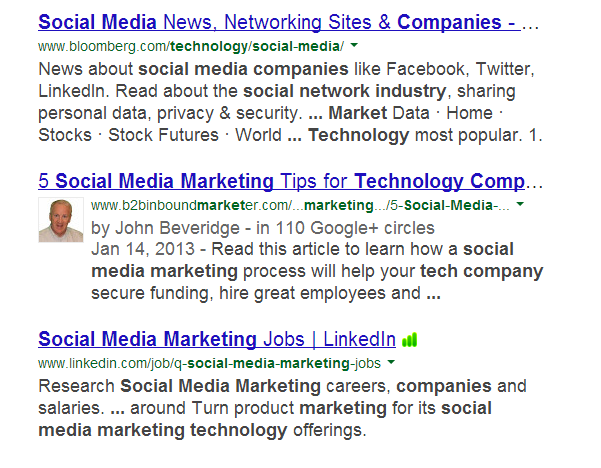 Search Engine Optimization (SEO) isn't what it used to be. SEO used to revolve around 2 things. First, old-school SEO focused on identifying keywords that buyers used to describe a company's products or services and inserting those keywords everywhere on the company's website. And I mean everywhere. Rather than publish content that provided people with useful information the way they wanted it, old-school SEO wrote for search engines. This made for some really crappy, unnatural writing.
Search Engine Optimization (SEO) isn't what it used to be. SEO used to revolve around 2 things. First, old-school SEO focused on identifying keywords that buyers used to describe a company's products or services and inserting those keywords everywhere on the company's website. And I mean everywhere. Rather than publish content that provided people with useful information the way they wanted it, old-school SEO wrote for search engines. This made for some really crappy, unnatural writing.
Secondly, old-school SEO focused on getting links to the company's website. It didn't matter where the links came from, old-school SEO was based on getting a ton of links. Quanity, not quality, was the goal. This resulted in schemes like "link farms" where SEO firms bought spammy links from dodgy websites.
Then Google came along and threw a monkey wrench into the works. With their Penguin and Panda algorithm updates, Google's new ranking algorithms penalized over-optimized content and spammy links and rewarded good content that gave searchers what they were looking for.
Not to say that keywords and links aren't important anymore. In fact you should be targeting keyword phrases that your buyers use and links from reputable sources. As an inbound marketing consultant, a link from HubSpot to my website is very valuable. A link from RajeshSEOShop.com not so much. Keyword phrases are important too - just make sure they appear naturally in your content.
But there's a lot more to search engine optimization than keyword targeting and links. HubSpot's Rebecca Churt identified the following as important factors in modern SEO:
- Tweets of your content
- Retweets of your tweets
- Website page load time
- Content marketing
- Rel-canonical management
Simply stated, customer experience optimization is the new SEO. Rather than marketing to search engines, focus your effort on providing a great experience to customers and prospects that come to your website. Not exactly a revolutionary idea, but it's amazing how few companies are doing it. With that said, here are some suggestions on how you can use SEO to satisfy your customers and hit your revenue goals.
Six words: content marketing, content marketing, content marketing.
You probably get the point. You can help your customers and position your company as a trusted advisor by publishing original content that educates your audience and helps them solve the problems they face. If you're not blogging, get started. Yesterday. Blogging is the most effective way to drive organic search traffic to your website. HubSpot found that companies that blog 15 or more times per month get 5 times more web traffic than companies that don't blog. They also found that small companies (1 to 10 employees) tend to see the biggest gain in traffic when they post more articles.
Premium content like eBooks, whitepapers, videos, trials and consultations are great lead generation drivers. You can convert your organic search traffic to leads by offering premium content in exchange for contact information.
Make sure your website is about your customers, not you!
Your website should be part of your salesforce. It shouldn't be brochureware that uses too many buzzwords to describe how great your company is. It should provide information that your customers want in a way that makes it easy for them to find what they want, when they want it.
Each of your website pages should have a goal (singular.) Presented with an overwhelming array of information and choices, the typical website visitor will bounce from your site if they can't find what they want quickly. Whitespace is your friend - use it to make the important content stand out for your visitors.
Page load time is also a crucial factor. If your page is loaded with Flash animation or is on a slow content management system, visitors won't wait. They'll bounce somewhere else if your page doesn't load quickly. Not only will your visitors bounce, Google penalizes website with long page load times.
Lastly, make sure your website is optimized for mobile devices. That's what your customers expect. If they try to access your site on their iPhone and get a miniature version of your desktop site, you'll look amateurish and behind the times. Most of them won't be able to access what they need because they can't see it.
If you haven't reviewed your website in the past few years, now is the time to do so.
Just because Google won't share keyword information with you doesn't mean they're not important.
In the fall of 2013, Google stopped sharing information with companies on the keywords searchers were using to find your website. That doesn't mean that targeting keyword phrases is no longer important, it just means that you need to adjust how you measure results.
We said earlier that each website page should have a goal. Each website page should also be based around a single keyword phrase. For example, an insurance broker may decide to target the phrase employee benefit cost management. The broker should include that phrase in the title of the web page, in an H1 header on the page and naturally within the web page copy.
By reviewing the traffic for that web page compared to other pages on the insurance broker's site, they can get an idea on how well that keyword phrase is driving traffic to their site.
Use Google authorship to distinguish your content
Google authorship links the content you publish to your Google+ profile. From an SEO perspective, it includes your photo in your search engine rankings on Google.

Searchers are more likely to click on a result with a photo than one that doesn't have a photo. You can sign up for Google Authorship here.
Summary
Old-school SEO is dead. Not only that, it's a waste of time that could hurt you more than it helps. If you create a website experience that regularly provides good information for your customers, Google will reward you with organic search traffic. Website traffic fills the top of your inbound marketing sales funnel. By providing the appropriate information at the right time to potential buyers, you'll generate the revenue you need to grow your bottom line. It's not easy, but the rewards make the effort worthwhile.









